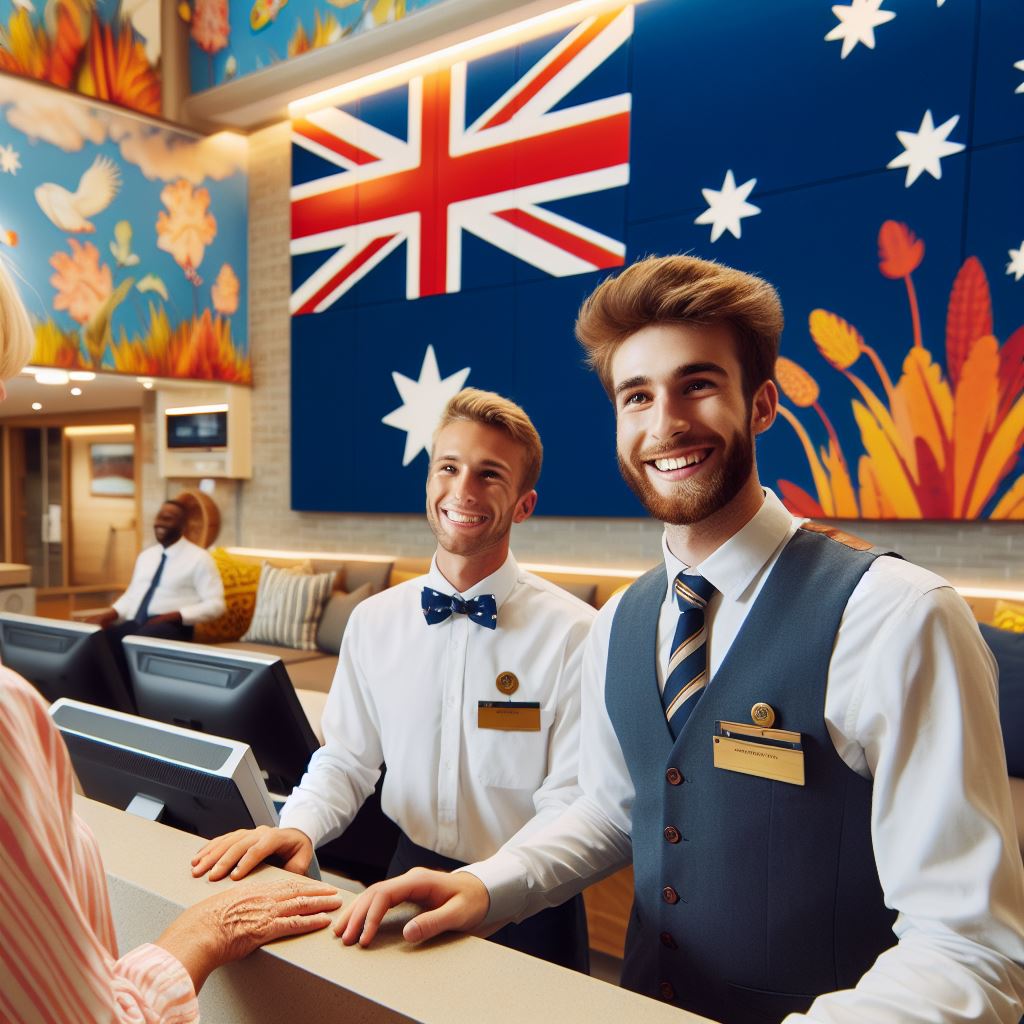Introduction
Overview of the Australian hotel industry and its significance in the economy
The Australian hotel industry plays a significant role in the economy, with hotel managers being crucial in ensuring smooth operations and guest satisfaction.
The Australian hotel industry is a vital sector, contributing significantly to the country’s economy. Hotel managers play a pivotal role in maintaining the industry’s success by ensuring efficient operations and meeting guest expectations.
The key role of hotel managers in ensuring smooth operations and guest satisfaction
These managers are responsible for overseeing the day-to-day operations of hotels, ensuring that everything runs smoothly. They handle various tasks, including staff management, customer service, and financial management, to provide a seamless experience for guests.
Guest satisfaction is of utmost importance to hotel managers. They strive to create a positive and comfortable environment for guests, fostering a pleasant and memorable stay. Handling guest complaints and resolving any issues promptly is crucial to maintaining a high level of satisfaction.
Additionally, hotel managers must ensure that the hotel meets the necessary standards and complies with industry regulations. This involves maintaining the hotel’s facilities and amenities to provide a safe and enjoyable experience for all guests.
Moreover, in an ever-evolving industry, hotel managers face challenges such as intense competition and changing consumer demands. They must adapt to market trends, implement innovative strategies, and stay updated with the latest technologies to remain competitive.
Furthermore, the COVID-19 pandemic presented unprecedented challenges for hotel managers. They had to implement stringent health and safety protocols to protect both guests and staff, while also managing financial constraints and fluctuating occupancy rates.
Basically, hotel managers in Australia play a pivotal role in the success of the hotel industry. They ensure smooth operations, prioritize guest satisfaction, and overcome various challenges, making them essential figures in the ever-growing hospitality industry.
Competitive Landscape
When it comes to the Australian hotel industry, the competition is fierce.
- There is a strong presence of both domestic and international hotel brands.
- Hotel managers face numerous challenges in trying to stay ahead of their competitors.
Competitive nature of the Australian hotel industry
Firstly, the Australian hotel industry is highly competitive due to the abundance of hotels across the country. With so many options available, hotel managers need to go the extra mile to attract guests and make their property stand out.
Presence of both domestic and international hotel brands
Moreover, the presence of both domestic and international hotel brands adds another layer of competition. These well-established brands have a loyal customer base and strong marketing strategies, making it difficult for independent hotels to compete.
Challenges faced by hotel managers in staying ahead of the competition
Hotel managers also face challenges in terms of price wars. In order to attract guests, hotels often engage in aggressive pricing strategies, offering discounted rates and promotions.
This can put pressure on hotel managers to constantly monitor competitor prices and adjust their own rates accordingly.
In addition to price competitiveness, hotel managers must also stay ahead when it comes to technology. With the rise of online booking platforms and review websites, guests have become more empowered and have higher expectations.
Hotel managers need to invest in technology solutions that enhance guest experience and streamline operations.
Furthermore, the Australian hotel industry is heavily influenced by seasonal demand. During peak seasons, hotels experience high occupancy rates and increased competition for bookings.
Hotel managers need to anticipate and prepare for these fluctuations in order to maximize revenue and maintain guest satisfaction.
Lastly, hotel managers face the challenge of providing personalized guest experiences. In a highly competitive landscape, it is crucial for hotels to differentiate themselves by offering unique and memorable experiences.
This requires creativity, attention to detail, and a deep understanding of the target market.
Your Personalized Career Strategy
Unlock your potential with tailored career consulting. Get clear, actionable steps designed for your success. Start now!
Get StartedTherefore, the Australian hotel industry is characterized by intense competition, with the presence of both domestic and international hotel brands. Hotel managers face challenges in various areas including pricing, technology, seasonal demand, and personalized experiences.
To thrive in this competitive landscape, hotel managers need to constantly innovate and find ways to stay ahead of the competition.
Read: Travel Agents: Trends in Australia for 2024
Staffing and Training
- Finding and retaining qualified staff in the hospitality sector is a challenging task.
- High turnover rate in the industry makes it difficult to maintain a stable workforce.
- Competition among hotels for the best employees adds to the difficulty of staffing.
- Shortage of skilled professionals, especially in specialized roles, further exacerbates the problem.
- Proper training and development programs are crucial for hotel staff to meet industry standards.
- Well-trained employees provide better service and enhance the overall guest experience.
- Training programs help employees acquire essential skills and keep up with industry trends.
- Ongoing development allows staff to adapt to changing guest expectations and technological advancements.
- Hotel managers face the challenge of allocating time and resources for training programs.
- Costs associated with quality training can be a barrier for hotels with limited budgets.
- Keeping staff motivated and engaged is vital for maintaining a skilled workforce.
- Providing recognition and rewards for exceptional performance helps boost employee morale.
- Effective communication between managers and staff is essential for fostering motivation.
- Encouraging a positive work environment and team collaboration also contribute to motivation.
- Ensuring a skilled workforce involves balancing staff development with operational needs.
- Hotel managers must find ways to offer training opportunities without disrupting daily operations.
- Scheduling training during quieter periods can minimize disruptions to guest services.
- Managers may face resistance from staff who are resistant to change or reluctant to participate in training.
- Addressing concerns and emphasizing the benefits of training is crucial in overcoming resistance.
- Providing continuous support and feedback to employees is necessary for their growth and development.
- Regular performance evaluations help identify areas for improvement and promote accountability.
- Investing in staff training and development ultimately leads to higher employee satisfaction and retention.
- A motivated and skilled workforce enhances productivity, guest satisfaction, and the overall success of the hotel.
Read: How to Become a Travel Agent in Australia
Customer Expectations and Experience
Evolving expectations of hotel guests in terms of services and amenities
The expectations of hotel guests in terms of services and amenities are constantly evolving. Nowadays, guests expect more than just a comfortable bed and a clean room. They want a unique and memorable experience.
Importance of personalized experiences and the impact of online reviews on a hotel’s reputation
Personalized experiences have become increasingly important for hotels. Guests want to feel special and valued during their stay. This can include personalized welcome messages, tailored recommendations, and customized amenities based on their preferences.
Online reviews have a significant impact on a hotel’s reputation. Potential guests heavily rely on these reviews when making their booking decisions. Positive reviews can attract more customers, while negative reviews can deter people from choosing a particular hotel.
Challenges hotel managers face in meeting and exceeding customer expectations
Hotel managers encounter challenges in meeting evolving guest expectations, including changing demands and ensuring personalized experiences.
Consistency in service delivery and managing online reviews are additional hurdles.
Prompt and effective responses to negative feedback are crucial for reputation management.
Balancing guest expectations with business sustainability poses a continuous challenge.
Technological advancements require adaptation to enhance the customer experience and manage online feedback.
Investing in staff training for exceptional service and soliciting guest feedback are key strategies.
Guest expectations are evolving, impacting hotel reputations, requiring adaptive strategies for success.
Read: Travel Agents: The Future in Aussie Tourism

Operational Efficiency
- Hotel managers oversee housekeeping, maintenance, and food services, crucial for smooth hotel operations.
- Managing costs while optimizing revenue poses a significant challenge.
- They streamline processes to maximize productivity and minimize wastage.
- Balancing operational efficiency with guest satisfaction remains a challenge.
- Ensuring rooms are cleaned to high standards is vital.
- They schedule housekeeping staff effectively to meet guest demands.
- Regular maintenance of facilities and equipment is essential.
- Coordinating with maintenance staff to address issues promptly is important.
- Food services, including kitchen and restaurant operations, are closely overseen.
- Managers ensure food preparation and service meet quality standards.
- They control expenses without compromising service quality.
- Identifying revenue opportunities through upselling or pricing strategies is important.
- Efficient operations are necessary for guest satisfaction and loyalty.
- Striking a balance between efficiency and guest satisfaction is crucial.
- Regular training and communication with staff facilitate achieving this balance.
- Engaging with guests to understand their needs is also important.
- Prioritizing operational efficiency while keeping guest satisfaction in mind is key.
Read: Salary Guide: Travel Agents in Australia
Uncover the Details: Aussie Hotel Management: Salary Insights
COVID-19 Pandemic Impact
The global pandemic has presented unprecedented challenges to the hotel industry
- Implementing health protocols has become a top priority for hotel managers.
- They are responsible for ensuring the safety and well-being of guests and staff.
- Hotel managers must navigate through reduced occupancy due to travel restrictions and lockdowns.
Hotel managers face ongoing challenges and uncertainties during the pandemic recovery phase
- Constantly changing guidelines and regulations pose difficulties in maintaining operations.
- They need to adapt their business models to cater to changing customer preferences and behaviors.
- Financial constraints resulting from reduced revenue and increased operational costs are a major concern.
Despite the challenges, hotel managers are finding innovative ways to stay afloat
- Implementing contactless check-in/out systems and digital solutions for guest communication.
- Offering flexible cancellation policies to instill confidence in potential guests.
- Enhancing cleaning protocols to reassure guests about their safety.
Hotel managers are also focusing on building and maintaining strong relationships within the industry
- Collaborating with local tourism boards and other stakeholders to promote domestic travel.
- Sharing insights and best practices with fellow hotel managers through industry associations.
- Engaging with guests on social media platforms to maintain brand visibility and connection.
As the recovery phase progresses, hotel managers face the challenge of staffing and HR management
- Recruiting and training employees to meet the changing demands of the industry.
- Ensuring staff morale and well-being in the face of uncertain job security.
- Implementing measures to retain and motivate skilled employees as the industry stabilizes.
Additionally, hotel managers need to navigate the uncertainties surrounding travel restrictions and border reopenings
- They must be prepared to adapt their operations quickly to changing circumstances.
- Continuously assessing market trends and customer demands to stay competitive.
- Developing contingency plans to mitigate the impact of future crises on their business.
Ultimately, hotel managers in Australia have faced numerous challenges brought by the COVID-19 pandemic
- They are responsible for implementing health protocols, ensuring guest safety, and managing reduced occupancy.
- Navigating through the recovery phase while facing ongoing uncertainties is a continuous challenge.
- However, through innovation, collaboration, and adaptability, hotel managers are finding ways to overcome these challenges.
You Might Also Like: The Future of Cheffing in Australia Post-2024
Conclusion
Australian hotel managers tackle diverse challenges daily, from evolving guest expectations to online reputation management complexities.
Adaptability and innovation are vital for thriving in the hospitality sector.
Guest expectations continually evolve, demanding continuous monitoring and adjustments.
Stand Out with a Resume That Gets Results
Your career is worth more than a generic template. Let us craft a resume and cover letter that showcase your unique strengths and help you secure that dream job.
Get HiredDelivering personalized experiences consistently requires robust systems for guest data utilization.
Online reviews wield significant influence, necessitating adept management by hotel managers.
Balancing guest demands with financial viability requires strategic decision-making.
Technological advancements, including social media, pose both opportunities and challenges.
Empowering staff through training and soliciting guest feedback are crucial strategies.
Overall, Australian hotel managers navigate dynamic challenges by embracing innovation and prioritizing guest satisfaction.




